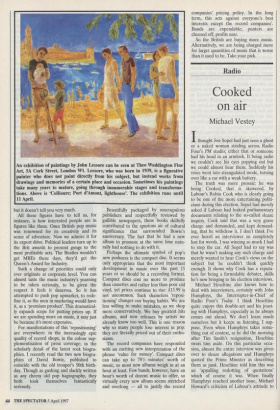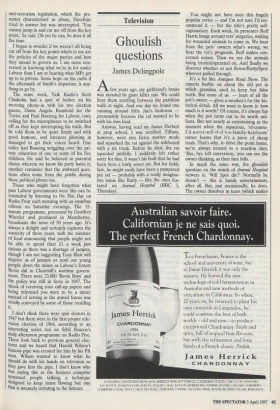Radio
Cooked on air
Michael Vestey
Ithought Jon Sopel had just seen a ghost or a naked woman striding across Radio Four's PM studio; either that or someone had his head in an armlock. It being radio we couldn't see his eyes popping out but we could almost hear them. Suddenly his voice went into strangulated mode, turning over like a car with a weak battery.
The truth was more prosaic: he was being Cooked, that is skewered, by Labour's Robin Cook who is clearly going to be one of the more entertaining politi- cians during this election. Sopel had merely asked if Labour had leaked parliamentary documents relating to the so-called sleaze inquiry. Cook said that was a very grave charge and demanded, and kept demand- ing, that he withdraw it. I don't think I've ever heard an interviewer so completely lost for words. I was wincing so much I had to stop the car. All Sopel had to say was that he wasn't making any such charge and merely wanted to hear Cook's views on the subject but he couldn't think quickly enough. It shows why Cook has a reputa- tion for being a formidable debater, skills he's now bringing to his election interviews.
Michael Heseltine also knows how to deal with interviewers, certainly with John Humphrys, the Interrupter-in-Chief of Radio Four's Today. I think Heseltine quite enjoys this double-act and his joust- ing with Humphrys, especially as he always comes out ahead. We don't learn much ourselves but it keeps us listening, I sup- pose. Even when Humphrys takes some- thing out of context, as he did the morning after Tim Smith's resignation, Heseltine swats him aside. On this particular occa- sion, almost the entire interview was given over to sleaze allegations and Humphrys quoted the Prime Minister as describing them as junk. Heseltine told him this was an 'appalling reslotting of quotations' which of course it was. When finally Humphrys reached another issue, Michael Howard's criticism of Labour's attitude to anti-terrorism legislation, which the pre- senter characterised as abuse, Heseltine tried to answer but was interrupted. 'You cannot jump in and cut me off from the key point,' he said. Oh yes he can, he does it all the time.
I began to wonder if we weren't all being cut off from the key points which to me are the policies of the major parties and how they intend to govern us. I am more con- cerned at knowing what we're in for under Labour than I am at hearing what MPs get up to in private. Some hope on the radio if the aftermath of Smith's departure is any- thing to go by.
The same week, Talk Radio's Scott Chisholm had a spot of bother on his morning phone-in with his two election guests, Dame Angela Rumbold for the Tories and Paul Boateng for Labour, once calling for the microphones to be switched off as they kept interrupting his trails. But he told them to be quiet firmly and with good humour, and listeners phoning in managed to get their voices heard. One caller had Boateng wriggling over the pri- vate education of one or some of his five children. He said he believed in parental choice whereas we know his party hates it; another reminder that the awkward ques- tions often come from the public during these political phone-ins.
Those who might have forgotten what past Labour governments were like can be reminded by listening to On This Day on Radio Four each morning with an omnibus edition on Saturday evenings. The 15- minute programme, presented by Geoffrey Wheeler and produced in Manchester, broadcasts the news of 50 years ago. It's always a delight and certainly captures the austerity of those years, with the minister of food announcing that people might not be able to spend their £1 a week jam rations as there was a shortage of jamjars, though I am not suggesting Tony Blair will deprive us of jamjars or send our young people down the mines as Labour's Ernest Bevin did in Churchill's wartime govern- ment. There were 23,000 `13evin Boys' and the policy was still in force in 1947. The shock of receiving your call-up papers and being informed you were to be a miner instead of serving in the armed forces was vividly conveyed by some of those recalling it.
I don't think there were spin doctors in 1947 but there were in the first proper tele- vision election of 1964, according to an Interesting series run on Sybil Ruscoe's daily afternoon programme on Radio Five. These look back to previous general elec- tions and we heard that Harold Wilson's famous pipe was created for him by his PR man. Wilson wanted to know what he should do with his hands on television so they gave him the pipe. I don't know who Was saying this as the features comprise unnamed people talking, a technique designed to keep items flowing but one that is intensely irritating to the listener.



























































 Previous page
Previous page